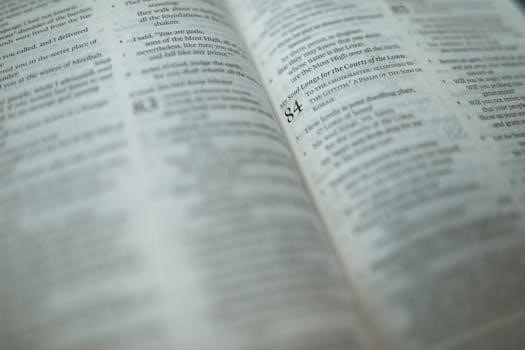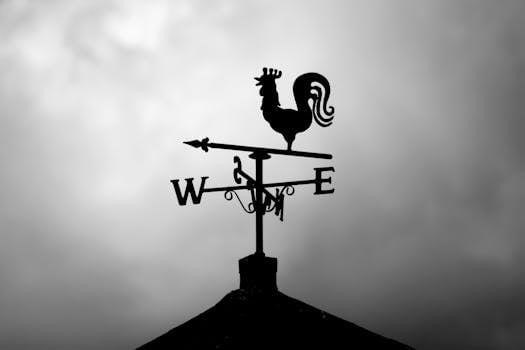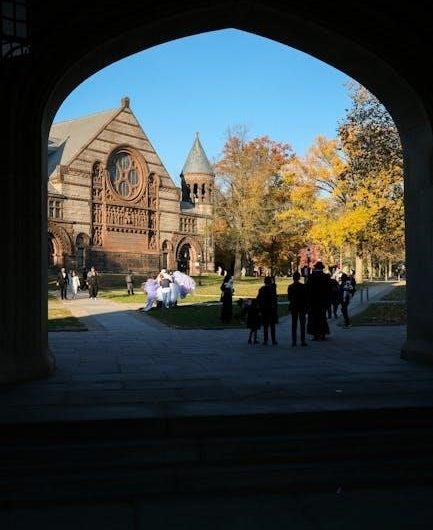
Psalm 23, a beloved passage, offers comfort and assurance․ It uses the metaphor of a shepherd to illustrate God’s care․ Many find solace in its simple yet profound message․ Exploring its verses provides insight into God’s provision and protection․ This psalm resonates deeply with people․

Authorship and Context
Psalm 23 is attributed to David, a shepherd and king․ His experiences shaped his understanding of God’s care․ The psalm is part of the Book of Psalms․ This book spans a broad timeframe, showcasing diverse circumstances․ Understanding this context enriches our interpretation of David’s words․ It reflects God’s enduring relationship with humanity․
David as Shepherd and King
David’s life as both a shepherd and a king profoundly shaped his understanding of leadership and care, which is vividly reflected in Psalm 23․ As a young shepherd, he tended his father’s flock, protecting them from predators and guiding them to sustenance․ This intimate experience instilled in him a deep sense of responsibility and compassion, qualities he would later need as king․
His reign as king of Israel brought new challenges․ He led a nation, made critical decisions, and faced enemies․ These experiences expanded his perspective on leadership, revealing the need for divine guidance and protection․ He recognized that just as sheep depend on their shepherd, his people depended on him, and he in turn, depended on God․
David’s unique background allowed him to see God as the ultimate shepherd, one who provides, protects, and guides His people․ He understood that true leadership meant caring for those under his charge, just as a shepherd cares for his sheep․ This understanding is beautifully expressed in Psalm 23, where David portrays God as the loving shepherd who leads him through life’s trials and tribulations․
The psalm reflects David’s personal journey, from the fields of Bethlehem to the throne of Israel, revealing his deep trust in God’s unwavering care and guidance․
Book of Psalms Placement
The Book of Psalms, a collection of 150 individual psalms, holds a significant place within the Old Testament and is part of the Wisdom Literature․ These sacred songs and poems span a vast period, from the time of Moses around 1410 BC to the post-exilic community under Ezra and Nehemiah, approximately 430 BC․ This extensive timeframe highlights the book’s enduring relevance and its ability to speak to various audiences across different historical contexts․
Psalm 23 specifically resides within the first book of Psalms, comprising Psalms 1-41․ This section often focuses on themes of trust in God, divine protection, and the relationship between God and His people․ The placement of Psalm 23 within this initial grouping emphasizes its foundational importance in understanding the broader themes of the Psalter․
As lyric poetry, the Psalms employ vivid imagery, symbols, metaphors, and allusions to convey deep spiritual truths․ Understanding the historical and cultural settings from which these images derive is crucial for interpreting their meaning․ In Psalm 23, the shepherd-sheep relationship serves as a central metaphor, requiring an understanding of shepherding practices in ancient Israel to fully grasp its significance․
The Book of Psalms, with Psalm 23 as a cornerstone, provides a rich tapestry of human emotion and spiritual insight, offering guidance and comfort to believers throughout the ages․

Theme⁚ God’s Shepherding Care
The central theme of Psalm 23 revolves around God’s unwavering and tender shepherding care for His people․ This psalm beautifully portrays the Lord as a shepherd, a metaphor deeply resonant with the ancient Israelites who were intimately familiar with pastoral life․ The shepherd-sheep relationship becomes a powerful symbol of God’s provision, protection, and guidance․
Throughout the psalm, we see various facets of this shepherding care․ The Lord leads His sheep to green pastures and still waters, symbolizing spiritual nourishment and refreshment․ He restores their souls, guiding them along paths of righteousness, ensuring they stay on the right course․ Even in the darkest valleys, the shepherd’s presence brings comfort and eliminates fear․
God’s shepherding care extends beyond mere physical provision․ It encompasses emotional and spiritual well-being․ The Lord prepares a table in the presence of enemies, signifying victory and abundance even amidst adversity․ He anoints heads with oil, a symbol of honor and blessing, and fills cups to overflowing, representing overflowing joy and satisfaction․
Ultimately, Psalm 23 assures believers that God’s shepherding care is constant and unending․ His goodness and mercy follow them all the days of their lives, promising a dwelling in His house forever․ This theme of God’s shepherding care offers profound comfort and hope, reminding us that we are never alone and are always under His watchful eye․

Verse-by-Verse Breakdown
Analyzing Psalm 23 verse by verse reveals deeper meaning․ Each verse unveils aspects of God’s shepherding care․ The breakdown explores themes of provision and guidance․ It emphasizes comfort in adversity and eternal hope․ Understanding each verse enhances appreciation of the psalm․
Psalm 23⁚1 ‒ The Lord is My Shepherd
The opening verse, “The Lord is my shepherd; I shall not want,” establishes a personal relationship with God․ It reflects David’s experience as both a shepherd and a king․ The Lord’s role as a shepherd implies care, guidance, and provision․ “I shall not want” suggests contentment and trust in God’s abundant supply․ David’s declaration emphasizes God’s role, highlighting confidence in divine care․
The verse speaks to our fundamental needs being met by God․ Just as a shepherd tends to his sheep, God tends to His people․ This verse assures believers that their needs are known and provided for․ It speaks to spiritual, emotional, and physical needs being satisfied through God’s loving care․ David’s words convey a sense of peace and security․
Declaring the Lord as one’s shepherd signifies a dependent relationship․ It requires humility and willingness to follow God’s lead․ The verse invites us to embrace God’s guidance․ It assures us that we are not alone in our journey․ It speaks of confidence in His ability to meet our needs, fostering gratitude and trust in His provision․
Psalm 23⁚2 ‒ Green Pastures and Still Waters
Verse 2, “He makes me lie down in green pastures, he leads me beside still waters,” illustrates God’s provision of rest and refreshment․ Green pastures symbolize abundance and nourishment, representing God’s ample provision․ “Still waters” represent peace and tranquility, a refuge from life’s storms․ The verse speaks to the soul’s need for restoration․ It promises a place of serenity under God’s care․
The image of lying down suggests a state of relaxation and trust․ It is a picture of surrendering to God’s provision․ The shepherd guides the sheep to places of nourishment and calm․ Similarly, God guides us to places of spiritual and emotional replenishment․ This verse calls us to slow down and receive God’s blessings․ It encourages us to find rest in His presence․
The green pastures and still waters are metaphors for spiritual well-being․ They signify the blessings of God’s presence․ They remind us that God desires to meet our deepest needs․ He leads us to places of abundance and peace․ The verse invites us to seek Him as the source of our satisfaction․ It assures us that He will provide all that we need to thrive․
Psalm 23⁚4 ⏤ The Valley of the Shadow of Death
Verse 4, “Even though I walk through the valley of the shadow of death, I will fear no evil, for you are with me; your rod and your staff, they comfort me,” addresses life’s most challenging moments․ The valley of the shadow of death symbolizes periods of darkness, suffering, and fear․ It represents the trials and tribulations we face․ Despite these difficulties, the psalmist declares a lack of fear, rooted in God’s presence;
The phrase “you are with me” emphasizes the importance of God’s unwavering presence․ It is a reminder that we are not alone in our struggles․ God’s presence provides comfort and strength․ The rod and staff, tools of a shepherd, symbolize guidance and protection․ The rod is used to defend against danger, while the staff provides support and direction․
Together, they represent God’s care and control over our lives, even in the darkest valleys․ This verse offers hope and reassurance in times of distress․ It encourages us to trust in God’s presence and protection․ It reminds us that He is with us, guiding and comforting us, even in the face of death․ The valley may be dark, but God’s light shines through․
Psalm 23⁚5 ‒ Table in the Presence of Enemies
Psalm 23⁚5 shifts the imagery from a journey to a feast․ “You prepare a table before me in the presence of my enemies․” This verse speaks of God’s provision and protection, even when surrounded by adversaries․ The table symbolizes abundance, fellowship, and blessing․ It is a place of nourishment and celebration․ The fact that it is prepared “in the presence of my enemies” highlights God’s power and sovereignty․
It signifies that God’s blessings are not contingent on the absence of opposition․ Instead, He provides even in the midst of hostility․ “You anoint my head with oil; my cup overflows․” Anointing with oil was a sign of honor, consecration, and joy․ It symbolizes God’s favor and blessing upon the psalmist․ The overflowing cup represents abundance and overflowing joy․
It signifies that God’s blessings are not limited but rather exceed our capacity to contain them․ This verse speaks of triumph over adversity․ It demonstrates God’s ability to bless and prosper us, even when surrounded by those who seek to harm us․ It is a testament to His faithfulness and provision, even in the face of opposition․ It is a comforting reminder that God’s blessings are not diminished by the presence of enemies․

Application and Comfort
Psalm 23 offers profound application and comfort in our daily lives․ Its message transcends time and circumstance, providing solace in moments of fear and uncertainty․ The psalm reminds us that God is our Shepherd, guiding and protecting us through life’s challenges․ We can apply its teachings by trusting in God’s provision, even when facing difficult situations․ When we feel lost or overwhelmed, we can find comfort in knowing that God leads us beside still waters and restores our souls․
Even in the darkest valleys, we need not fear, for God is with us․ The “table in the presence of enemies” symbolizes God’s ability to bless us, even amidst adversity․ We can find application in recognizing God’s constant presence and care․ The overflowing cup represents the abundance of God’s blessings, filling our lives with joy and satisfaction․ We can find comfort in knowing that God’s goodness and mercy will follow us all the days of our lives․
Ultimately, Psalm 23 points us to a future dwelling in the house of the Lord forever, where we will experience eternal peace and joy․ It offers hope and assurance, reminding us that God’s love endures through every season of life․ This psalm’s comforting words and timeless truths continue to resonate with believers across generations․
Psalm 23, a timeless testament to faith, resonates deeply within the human spirit․ Its enduring message of comfort and assurance continues to offer solace across generations․ As we reflect on its verses, we are reminded of God’s unwavering presence and provision in our lives․ The psalm’s shepherd metaphor paints a vivid picture of divine care, guiding us through life’s valleys and leading us to green pastures․
The comfort found in Psalm 23 stems from its depiction of a personal relationship with God․ It underscores God’s attentiveness to our needs and His commitment to protect us from harm․ The psalm’s promise of an overflowing cup and a table in the presence of enemies speaks to God’s abundant blessings even amidst adversity․
In essence, Psalm 23 invites us to trust in God’s loving guidance and to find peace in His presence․ Its message transcends cultural and historical boundaries, offering a universal source of hope and encouragement․ As we embrace the psalm’s teachings, we can experience a deeper connection with God and a renewed sense of purpose in our lives․ This psalm truly embodies the essence of faith, reminding us that we are never alone on our journey․
 zen the art of archery pdf
zen the art of archery pdf  fruit of the spirit pdf
fruit of the spirit pdf  norwegian sun deck plan pdf
norwegian sun deck plan pdf  free disc personality test pdf
free disc personality test pdf  body language pdf
body language pdf  aperture shutter speed iso chart pdf
aperture shutter speed iso chart pdf  aldi k fee coffee machine manual
aldi k fee coffee machine manual  princeton guide to historical research
princeton guide to historical research  guide de consommation de carburant 2023
guide de consommation de carburant 2023